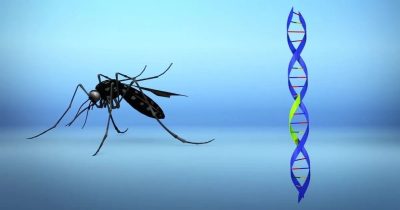Money and Weaponized Mosquitos: Dengue Fever Surges by 400% in Brazil After Bill Gates-Backed Gene-Edited Mosquitos Released
The dramatic spike in dengue cases has prompted Brazil to purchase millions of doses of the dengue vaccine.

All Global Research articles can be read in 51 languages by activating the Translate Website button below the author’s name (only available in desktop version).
To receive Global Research’s Daily Newsletter (selected articles), click here.
Click the share button above to email/forward this article to your friends and colleagues. Follow us on Instagram and Twitter and subscribe to our Telegram Channel. Feel free to repost and share widely Global Research articles.
Big Tech’s Effort to Silence Truth-tellers: Global Research Online Referral Campaign
***
Dengue fever has spiked fourfold in Brazil in 2024 following the release of millions of gene-edited mosquitos by the United Nations’ World Mosquito Program.
In the first five weeks of 2024, over 364,000 cases of dengue infection have been reported, according to the country’s health ministry, which is 4x greater than previous cases in the same period of 2023.
The dramatic spike in dengue cases has prompted Brazil to purchase millions of doses of the dengue vaccine.
From The Guardian:
The rapid spread of dengue has caused 40 confirmed deaths, the ministry said, and a further 265 are being investigated.
Brazil has bought 5.2m doses of the dengue vaccine Qdenga, developed by Japanese drugmaker Takeda, with another 1.32m doses provided at no cost to the government, a ministry statement said.
Three Brazilian states have declared emergencies, including the second most populous state, Minas Gerais, and the Federal District, where the capital, Brasília, is located and is facing an unprecedented rise in infections.
Brasília will start vaccinating children aged 10-14 on Friday with Qdenga, the local government said on Wednesday.
Cases of dengue in Brasília since the start of the year have exceeded the total for the whole of 2023, with a rate of infection of 1,625 cases per 100,000 inhabitants, compared with the national average of just 170.
The UN’s World Mosquito Program announced in 2023 a plan to release billions of gene-edited mosquitos in Brazil over a 10-year period in a bid to eradicate dengue fever in the country.
“Brazilian health officials in five cities have been releasing clouds of lab-grown Aedes aegypti mosquitoes infected with Wolbachia bacteria, which prevents dengue virus transmission to humans,” Harvard Public Health reported in August 2023.
“The country will be the first to launch a nationwide program to release Wolbachia-modified mosquitoes, which are expected to protect up to 70 million people from dengue fever over the next 10 years. And it’s building a factory to scale up mosquito production: Beginning 2024, the factory will mass-produce five billion mosquitoes a year.”
Now a year after the mosquito initiative began, dengue cases have risen sharply rather than fallen.
Notably, the World Mosquito Program received a $50 million grant from the Bill & Melinda Gates Foundation.
The Bill & Melinda Gates Foundation is also bankrolling research into the dengue fever vaccine.
The Brazilian government purchased over 5 million doses of the Qdenga dengue fever vaccine, manufactured by Japanese drugmaker Takeda, which also received millions of dollars in grants from the Bill & Melinda Gates Foundation.
In other words, Bill Gates Foundation money is involved in all sides of the situation, from the gene-edited mosquitos — which has apparently exacerbated the dengue crisis — to bankrolling companies who are providing the in-demand dengue fever vaccine to Brazil.
To what end?
*
Note to readers: Please click the share button above. Follow us on Instagram and Twitter and subscribe to our Telegram Channel. Feel free to repost and share widely Global Research articles.
Featured image source

